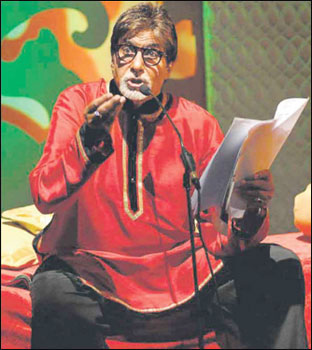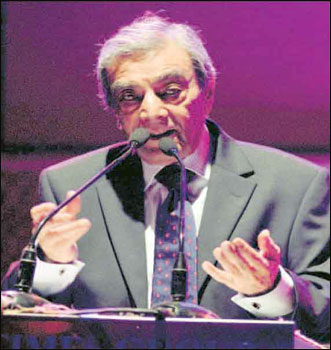 Bair badhate mandir masjid, mel karati madhushala... Harivansh Rai Bachchan's words can make even the most unpoetic person stop and listen. More so, when his firstborn recites them. Which is exactly what happened at Mumbai's Bandra Fort on Monday evening, as Amitabh Bachchan gave voice to his father's words and enthralled the packed audience. Bair badhate mandir masjid, mel karati madhushala... Harivansh Rai Bachchan's words can make even the most unpoetic person stop and listen. More so, when his firstborn recites them. Which is exactly what happened at Mumbai's Bandra Fort on Monday evening, as Amitabh Bachchan gave voice to his father's words and enthralled the packed audience.
But let's start at the beginning. Setting the mood for the evening with Faiz Ahmed Faiz's verses was Pakistani actor Zia Mohyeddin. Dressed in a sharp suit, complete with cufflinks and a tie, Mohyeddin was every bit the perfectly gorgeous gentleman. "Faiz, who spent months in jail, celebrated India's freedom as much as anybody else did but also mourned its partition equally," said the actor.
"Yeh daagh daagh ujala yeh shabguzeda sahar, woh intezar tha jiska yeh woh sahar to nahin" (This black-sooted light, this night-smeared morning, this is not the morning we had waited for) - the couplet captured the poet's angst beautifully. "But Faiz was not all about angst," clarified Moheyuddin. "He celebrated the other shades of life as well." The actor wound up his performance with Faiz's famous prayer Aaiye hum haath uthaien.
As Moheyuddin walked off stage to a thunderous applause, anticipation hung heavy in the air. A simple "Mr Bachchan is backstage" announcement sent the audience into a frenzy. Jaya Bachchan was called on stage to introduce the man. "Ye mere pati hain, apne pita ki kavitaein sunaenge," (This is my husband, he will recite his father's poetry), she said.
Viju Shah and his musicians gave the Badshah of Bollywood a fitting opening score. Seconds later, Amitabh Bachchan walked in, dressed in a deep red silk kurta teamed with black pajamas. And then he sang...
The ramparts of the fort resonated with his deep baritone and the crowd sang along, mesmerized by the evening.
Penned in 1933, Madhushala (The Tavern) is a milestone in the history of Hindi poetry. It speaks of life's pain, beauty, love, sorrow and death. Bachchan received racous applause when he sang the famous, moving verse "Mere shav ke peechche chalne walon yaad isse rakhna/Ram naam hai satya kehna, kehna sachee Madhushala" (When you bear my corpse, remember, call not the name of God, but call to the truth that is the tavern).
Bachchan also recited lines from Jeevan Ki Apa Dhapi (Rush of Life), Jo Beet Gayee So Baat Gayee (What's Gone is Gone) and Khoon Ke Chhape (Bloodstains).
He regaled the audience with Kya Karoon Samvedna Le Kar Tumhari, Kya Karoon, adding that it was the poem his father read out to his mother when they first met at a common friend's house. There was a delightful poem about a dancing hall in Cambridge, where Bachchan senior studied.
" There was a Buddha statue in one corner of the hall and my father found that quite interesting," he said. The poem itself begins with the Buddhist chant Buddham, sharanam, gachchami and ends with the witty 'Danceam sharanam gachchami. The Big B also sang the folksy Son Machchri and Khoyi Gujaria and the crowd got up to dance. There was a Buddha statue in one corner of the hall and my father found that quite interesting," he said. The poem itself begins with the Buddhist chant Buddham, sharanam, gachchami and ends with the witty 'Danceam sharanam gachchami. The Big B also sang the folksy Son Machchri and Khoyi Gujaria and the crowd got up to dance.
When it was finally time for him to leave, nobody wanted him to go. As a parting shot for his fans who spanned generations (adman Prasoon Pandey brought his mother in a wheelchair and she went back beaming), Amitabh Bachchan did an encore of Madhushala. And left everyone thirsting for more.
Faiz Ahmed Faiz
Faiz Ahmed Faiz is perhaps one of the most revered poets in Urdu literature. He has written everything from delicate love poems to rousing social anthems. He supported Communism for a while and was part of the Progressive Writer's Movement in Pakistan His ghazal, 'Hum Dekhein Ge' ('We Shall Witness') is particularly socially charged, and was sung by Iqbal Bano.
Faiz Ahmed Faiz was awarded the Lenin Peace Prize and was nominated for a Nobel Peace Prize before he died.
Harivansh Rai Bachchan
Most famous today for being Bollywood star Amitabh Bachchan's father, Harivansh Rai Bachchan has a rich literary history that can prop respect for him up on its own.
Harivansh served in the External Affairs Ministry as an officer on Special Duty and during his 10 years of government service, helped the process of establishing Hindi as India's official language.
"Mitti ka tan, masti ka man, kshan-bhar jivan- mera parichay (A body of clay, a mind full of play, a moment's life - that is me)," was how he would introduce himself to people.
Harivansh Rai Bachchan was awarded the Sahitya Akademi Award, a Padma Bhushan, Saraswati Samman, the Soviet Land Nehru Award and the Lotus Award of the Afro-Asian Writer's conference. |

